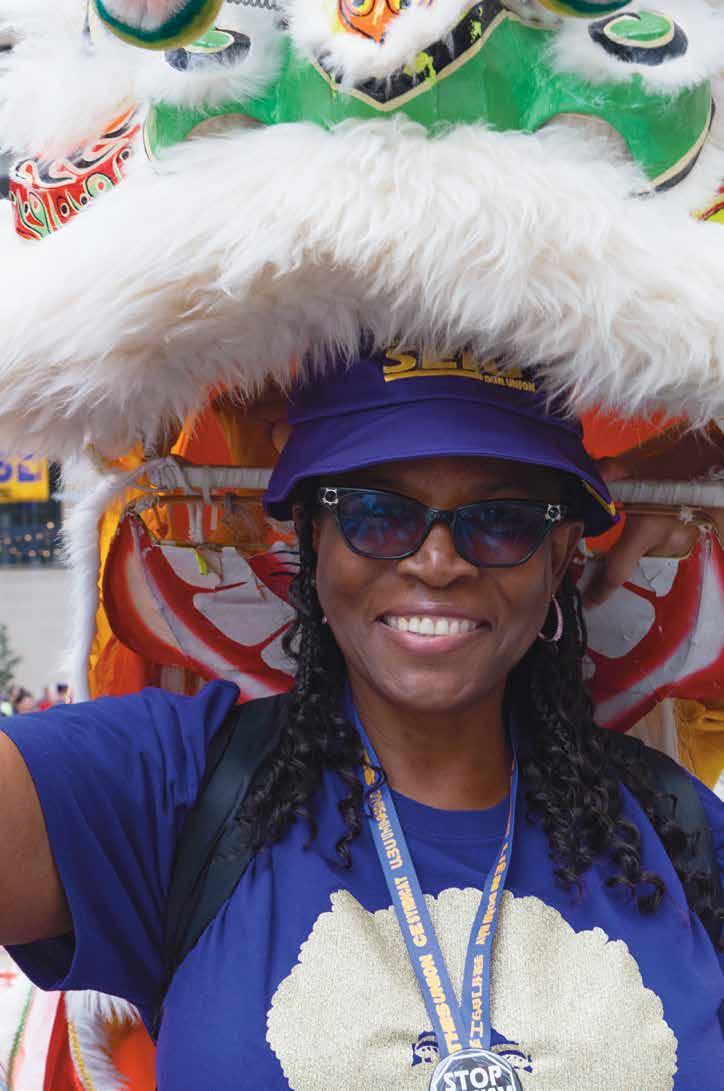
1 A Journal of 1199SEIU May-June 2024 Our History: LGBTQ+ Inclusion Creative Art Therapists: Lobbying for Justice Work We Do: Planned Parenthood This Union, Our Union


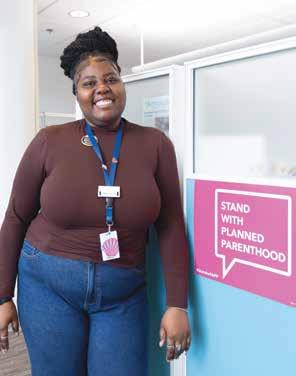
4 Reproductive Freedom Florida members are fighting for the freedom to make their own personal health care decisions.
5 The President’s Column Celebrating Juneteenth.
6 Around the Regions Phelps Victory; Pride Parades; Safe Staffing Lobby; Celebrating AAPI month; Massachusetts Lobby Day; Political wins in Maryland.
9 The Work We Do Planned Parenthood League of Massachusetts
12 Nurses of Distinction
The annual celebration during Nurses Week to honor those most committed to the profession.
14 Building Power Thousands of union members converge on Philadelphia for the quadrennial SEIU Convention.
18 Delegate Profile: Mary Samaroo An 1199er for three decades charts her path to discovering that the key to leading is being able to listen to others.
20 A Special Kind of Therapy How members are taking their case to Albany to increase access to Creative Arts Therapies.
21 LGBTQ+ Solidarity ‘An injury to one is an injury to all.’
Editorial: The Struggle is Real
The economic problems faced by workers are very real. Building worker power and unity is the only way to solve them.
@1199seiu
www.1199seiu.org
Working people are struggling. Corporations are not. Overall profits recorded by corporations reached a record high in the fourth quarter of 2023. But hefty profits rarely translate into lower prices.
Businesses run by large corporations, like supermarkets and fuel companies, would much rather pocket even bigger profits than reduce their prices. Since these corporations hold monopoly control over the providers of most essential goods and services in our economy, they can and do charge whatever they can.
After all, working people usually do not have much choice about where they shop for food, buy gas for their cars or energy to heat their homes. They just have to find the money to pay the higher prices to buy what they need. At the same time, they have to deal with “shrinkflation”. That is when the size of a product like a box of cereal is made smaller, but the price remains the same.
At the end of 2023, Americans were paying at least 30 per cent more for beef, pork and poultry products than they were in 2020. How could this be? Just four companies now
control the processing of 80 per cent of beef, nearly 70 per cent of pork and almost 60 per cent of poultry. So, it is easy for these companies to coordinate their price increases –giving consumers little choice but to pay them.
All of this explains why people feel as though their economic situation is worse, even when the statistics show that things are getting better. After all, wages are rising, and inflation is decreasing.
Wages have been going up because more and more workers have come together to collectively bargain better contracts with their unions. The trouble is that wages have not risen quite as fast as the prices, which have been jacked up by the greedy corporations who monopolize the American marketplace.
As delegates representing the roughly two million members of the Service Employees International Union (SEIU) gathered in Philadelphia in late May (see Building Power, p. 14), the 1199 contingent was the largest. One of the key themes at the convention was highlighting excessive
corporate profits while building worker power to negotiate higher wage increases.
Building worker power also means rejecting any attempts to divide us along racial, ethnic or gender lines. That is why the convention also focused on dismantling structural racism.
1199SEIU is actively addressing this issue by holding workshops with staff and members across the Union to air traumatic experiences caused by racism and discuss how the labor movement can help to build a more inclusive society.
Inclusivity needs to underpin all the work that we do. Part of that is celebrating our members in all their racial, ethnic and religious diversity. During Pride month, we are also reflecting on past contract wins including LGBTQ+ members, but also looking towards a more Queer-inclusive future (see LGBQT+ Solidarity, p. 21).
We know that anything that is thrown up to divide us, whether it be based on race or sexual orientation, or anything else, is simply a boss tactic to dimmish our power. We won’t stand for it.

1199 Magazine 3 2 May-June 2024
4
1199 Magazine May-June 2024 Vol. 42 No.3 ISSN 2474-7009 Published by 1199SEIU, United Healthcare Workers East 498 Seventh Ave, New York, NY 10018 (212) 582-1890 www.1199seiu.org president George Gresham secretary treasurer Milly Silva senior executive vice presidents Yvonne Armstrong Veronica TurnerBiggs executive vice presidents Jacqueline Alleyne Lisa Brown Roger Cummerbatch Tim Foley Adekemi Gray Todd Hobler Patricia Marthone Brian Morse Joyce Neil Roxey Nelson Rona Shapiro Gregory Speller Daine Williams Nadine Williamson editor Sarah Wilson art direction and design Maiarelli Studio director of photography Kim Wessels contributors Leyla Adali Marlishia Aho Jenna Jackson JJ Johnson Rose Ryan Desiree Taylor 1199 Magazine is published six times a year—January/ February, March/ April, May/June, July/ August, September/ October, November/ December—for $15.00 per year by 1199SEIU, United Healthcare Workers E. 498 Seventh Ave, New York, NY 10018 Periodicals postage paid at New York, NY, and at additional mailing offices. POSTMASTER: Send address changes to 1199 Magazine, 498 Seventh Ave, New York, NY 10018
is that wages have not risen quite as fast as the prices, which have been jacked up by the greedy corporations who monopolize the American marketplace.
The trouble
CONTENTS 14 9 The 1199 contingent at the SEIU convention in Philadelphia.
cover: Sophia Colley, an 1199 CNA from Titusville Rehab and Nursing near Cape Canaveral, FL, shares a moment with a performer celebrating AAPI Heritage month at the SEIU Conference in Philadelphia.
Reproductive Freedom
Florida members are fighting for the freedom to make their own personal health care decisions.
Members across every 1199 region are working hard to restore and protect women’s reproductive rights and privacy in Florida after an extremely restrictive law took effect in the sunshine state on May 1.
Florida lawmakers have now made it a felony to perform or actively participate in an abortion after six weeks of pregnancy. Because the beginning of pregnancy is counted from a woman’s last period, that usually leaves only two weeks after a missed period for a person to even recognize they are pregnant. Since the law also requires two inperson visits to a clinic, 24 hours
apart, before a termination can be performed, the new restrictions make it almost impossible to end a pregnancy in Florida.
Since the Supreme Court overturned the constitutional right to abortion in 2022, the states which surround Florida have also either eliminated or severely restricted reproductive rights. In practice, this means only those who have the funds to travel roughly 1,000 miles still have access to comprehensive reproductive healthcare.
That is why 1199ers have joined a statewide campaign to restore reproductive freedom.

“It’s a travesty that Florida politicians are trying to take away important rights of our loved ones. Let’s all fight together, vote yes on Amendment 4.”
– Mark DeFord, Registered Nurse

Celebrate. Educate. Agitate.
Let’s make sure the Juneteenth federal holiday is recognized in all of our contracts.
Mark DeFord, an 1199 RN, attending the rally in Orlando.
Wearing purple “Standing Up For Reproductive Freedom” shirts, more than 150 members and staff from across the state gathered at Orlando’s Lake Eola on April 13, for the Amendment 4 campaign kickoff rally organized by Floridians Protecting Freedom.
The initiative on the November 2024 ballot is an amendment to the State of Florida Constitution and would reverse the six-week abortion ban which puts women’s health at risk and interferes with private medical decisions.
Speakers at the rally described heartbreaking real-life medical and personal tragedies they experienced without access to necessary reproductive care, and desperately urged the large crowd to do all they can to make sure that Amendment 4 passes.
“As a U.S. Marine I served overseas and fought for our freedoms,” said Mark DeFord, now still serving the public as a Registered Nurse (RN) and 1199SEIU member. “It’s a travesty that Florida politicians are trying to take away important rights from our loved ones. Let’s all fight together—vote ‘yes’ on Amendment 4.”
Scan the QR code to support the Yes on 4 campaign.

Jacqelyn Wheeler, an 1199 Patient Safety Attendant, added, “I’m a mother, grandmother and a healthcare worker. I’m voting ‘yes’ on Amendment 4 because politicians shouldn’t be getting involved in personal decisions between me and my doctor.”
Scan the QR code (left) to support the “Yes on 4” campaign to ensure that the people of Florida have the freedom to make their own personal health care decisions—including abortion— without interference from politicians.
Here’s something lots of folks don’t know: Juneteenth, officially “Juneteenth National Independence Day,” is a federal holiday in the United States. It is celebrated annually on June 19 to commemorate the ending of slavery.
The holiday is considered the longest-running African American holiday and has been called America’s second Independence Day. Juneteenth celebrations historically have three goals: celebrate, educate, and agitate.
Although Juneteenth has been celebrated for 160 years— primarily by Black communities mainly in the South—it was finally recognized as a federal holiday in 2021, when President Joe Biden signed it into law.
More than a century and a half earlier, on September 22, 1862—President Abraham Lincoln announced the Emancipation Proclamation going into effect on January 1, 1863, promising freedom to enslaved people throughout the traitorous Confederacy—including Texas. Of course, the slaveholders were not about to voluntarily free those they held in bondage. So, enforcement of the Emancipation Proclamation generally relied upon the advance of Union troops. Texas, as the most remote state of the former Confederacy, had seen an expansion of slavery because the presence of Union troops was low.
It wasn’t until June 19, 1865— two-and-a-half years after the Emancipation Proclamation was announced, and two months after the end of the civil war—when U.S. Major General Gordon
Granger and his troops arrived in Galveston that emancipation was finally proclaimed in Texas, and the last of enslaved Americans were freed.
The name Juneteenth is a mixture of the words, “June” and “nineteenth”, and celebrates the end of 250 years of slavery. Juneteenth has since been observed annually, often broadly celebrating African American culture.
Early celebrations date back to 1866, and initially involved church-centered community gatherings in the South. Those who journeyed to the North and to the West during the Great Migration of the early 20th Century brought these celebrations to the rest of the country. Beginning with Texas by proclamation in 1938, and by legislation in 1979—every U.S. state and the District of Columbia has formally recognized the holiday in some way.
Early celebrations consisted of baseball, fishing, rodeos, street fairs, cookouts, family reunions, park parties, historical reenactments, blues festivals, voter registration, and “Miss Juneteenth” contests. African Americans were often prohibited from using public facilities for their celebrations, so they were often held at churches.
Making Juneteenth a federal holiday was hardly automatic. As with the establishment of Martin Luther King, Jr. Day in January, it was only achieved through lots of struggle, campaigning, and organizing.
Making Juneteenth a federal holiday was hardly automatic. As with the establishment of Martin Luther King, Jr. Day in January, it was only achieved through lots of struggle, campaigning, and organizing. We all know racism is alive and well in these United States. In some places, it’s getting worse. More than 20 states have passed laws in recent years curtailing the study of US history in public schools—especially the Civil War, Reconstruction, and the Civil Rights movement.
But I want to suggest the best way we can celebrate this important day. In our recently secured contract with the League of Voluntary Hospitals in New York, we won the addition of Juneteenth as a paid holiday for our members. This is a terrific achievement, but we have hundreds of other contracts in our hospitals, nursing homes and homecare agencies from the Canadian border to Florida. And all of our Union siblings should enjoy a Juneteenth paid holiday just as members in New York’s League institutions do. So, let’s make that our goal. When contract renewal comes up next time— wherever and whenever it is—let’s make that one of our demands. We are one union after all. Meantime, I want to wish all of our 1199 family a wonderful Juneteenth this year.
1199 Magazine 5
The President’s Column by George Gresham
4 May-June 2024 OUR UNION
Around the Regions
Victory at Phelps Hospital
Members at Phelps Hospital reached a tentative agreement at 5:13 a.m. in the morning on May 30th, narrowly averting a one-day strike planned for the following day.
The agreement wich includes substantial wage increases–retroactive to April 2023–brings the members at the Sleepy Hollow, NY, facility onto a par with their 1199SEIU co-workers at other Northwell Health facilities.
“Nine hundred caregivers standing together are more powerful than any of us standing alone—and that’s how we won so much,” said Anne Moss, an 1199 RN in the intensive care unit who has worked at the hospital since 2011, “Caring for our patients is our top priority and we are looking forward to working collaboratively with management to strengthen patient care.”
The 238-bed Phelps Hospital is part of Northwell Health which is New York State's largest healthcare provider and private employer.
In June 2022, approximately 900 Phelps Hospital caregivers includ-
ing registered nurses, certified nursing assistants; housekeeping staff, food service workers, and others voted to form a union with 1199SEIU. Tens of thousands of 1199SEIU members at other Northwell facilities, including nearby Northern Westchester Hospital, already have strong 1199SEIU contracts.
1199ers at Phelps demonstrated their solidarity for many months to bargain a strong first contract, which is modeled after the pattern established by 1199SEIU’s master contract with the League of Voluntary Hospitals and Homes of New York, and also includes no-cost family health insurance and secure pensions.
Other highlights of the agreement are employer paid childcare and education funds, job security provisions, and language ensuring that frontline caregivers will have meaningful input in developing staffing guidelines to ensure the best possible patient care.
As this edition was going to press members were planning to hold a ratification vote in early June.
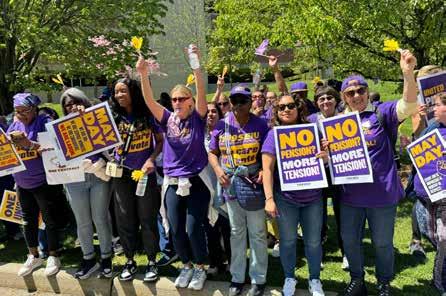
“Nine
hundred caregivers standing together are more powerful than any of us standing alone—and that’s how we won so much.”

Pride Parades
The the ranks of 1199 continue to grow and diversify, including members who perform gender-affirming care at Planned Parenthood and other specialized clinics. Membership in the 1199 LGBTQIA+ Caucus is growing, too. As this edition was going to press, 1199ers were planning to attend the 2024 Buffalo Pride Parade on June 2.
1199ers downstate, too, are actively planning their participation in the New York City Pride Parade on June 30. Scan the QR code to join the NYC 1199 contingent.


Safe Staffing Lobby
1199ers joined New York State Nurses Association, CWA District 1, DC37, UFT—United Federation of Teachers, NYSUT—A Union of Professionals in Albany on May 13, to demand that the New York State Health Department (NYS DOH) stand with healthcare workers to protect patients by enforcing safe staffing law.
“I went to Albany to fight for safe staffing and to encourage NYS DOH to hold our employers accountable,” said Terri Ross, RN from Niagara County. “Our staffing crisis isn’t fixed, and healthcare workers around the state joined together to demand that our voices be heard today.”
Celebrating AAPI month
1199 RNs at Mount Sinai Queens attended the annual Damayan health fair on May 11, offering free health screenings in honor of Asian-American and Pacific Islander Heritage Month. Damayan is a grassroots organization that serves and empowers low-wage Filipino migrant workers living and working in New York City and New Jersey. At the Union headquarters in Manhattan, the 1199 API caucus mounted a display depicting the long history of Asian-American and Pacific Islander participation in the healthcare field.

1199 Magazine 7
ALBANY, NY
Florida Maryland Massachusetts New Jersey New York Washington, D.C.
HUDSON VALLEY, NY
Members picketing at Phelps Hospital.
Members rally for safe staffing enforcement in Albany, NY.
Mount Sinai
RNs help out at the health fair in Queens.
6 May-June 20 24
– Anne Moss, registered nurse at Summit
QUEENS, NY
Around the Regions
BOSTON, MA
“Raise
my Wage, Cap my Rent”
On May 15th, nearly 300 members united for the annual Healthcare and Homecare Worker Advocacy Day, where member leaders from across the state talk directly with state legislators in Boston about Union priorities to strengthen care and invest in members’ communities. This year’s event included a rally for housing affordability and a $20/hr minimum wage alongside community partners. The “Raise
My Wage, Cap My Rent” campaign has highlighted the struggles caregivers face to remain in the communities they care for, and the need for a minimum wage that allows workers—new and seasoned—the ability to thrive.
“It was important for me to be here, to speak out regarding the ongoing wage issues weʼve experienced, and to hear from elected officials about the [bankruptcy] at Steward Health Care. I love my job and want to remain caring for my patients,” said Zenalia Freitas, an 1199 Pharmacy Technician at Good Samaritan Medical Center at Brockton, MA, which is part of the Steward network.

“It was important for me to be here, to speak out regarding the ongoing wage issues”
– Zenalia Freitas, 1199 Pharmacy Technician, Good Samaritan Medical Center Massachusetts members marching at their annual advocacy day in Boston.
Ida Davis, an 1199 Delegate from Prince George’s county with Wes Moore, Governor of Maryland.

BALTIMORE, MD
Political wins in Maryland
As the political season ramps up, firsttime member political organizer Ida Davis, a delegate from the University of Maryland Capital Region Health Center in Largo, Maryland, was excited for her fellow MPOs to learn more about Prince George’s County Executive Angela Alsobrooks. Most of the other program members, she explained, were from Baltimore, but Ida was familiar with the County Executive as a Prince George’s County resident. Alsobrooks is running against former Republican Governor Larry Hogan of Maryland in a bid to protect a blue seat in the U.S. Senate.
“As [the other members] saw her strength and voice and the important work that she has done in Prince George’s County, she won them over,” Ida said—noting that she saw Alsobrooks’ momentum grow steadily—even as she faced an opponent with tens of millions of dollars to spend.
The Work We Do:
Planned Parenthood League of Massachusetts
In the two years since the U.S. Supreme Court decision to eliminate the constitutional right to abortion, the majority of states have imposed some legal restrictions on reproductive rights, with 14 states getting rid of abortion access altogether. Members at the Planned Parenthood League of Massachusetts (PPLM) organized with 1199 SEIU shortly after that momentous decision was handed down. In July 2022, they voted ‘Yes’ almost unanimously and have since successfully negotiated their first contract. It runs through December 2025 and covers workers in Boston, Worcester, Marlborough, and Springfield. The contract ensures annual raises, including a $2.40 per hour acrossthe-board wage increase, bringing every member above the living wage in the state and boosting the wages of the lowest-paid workers by 13 percent. The 1199 Magazine caught up with a few PPLM members in Boston to learn more about their work.
(Editor’s Note: To protect against online harassment, we have agreed to omit their last names.)
1. As a Patient Access Representative at the Planned Parenthood–Greater Boston Health Center just a few blocks from Boston University, Samantha is one of the first people that patients see when they walk through the door. She manages the reception desk. “People ask me if it’s normal to have people protesting outside,” Samantha says. “Some people feel emotional or scared to go through it. I try to console them by telling them that these people have nothing better to do. Whatever someone wants to do with their own body is their own decision. I’m onehundred-percent supportive of the right to abortion.”
“I’m so excited that she won the primary. 1199 goes all out for our candidates—everyone knows us in our purple shirts,” she added. Along with the other MPOs, Ida knocked doors for Alsobrooks and other local candidates. 1

8 May-June 2024
1199 Magazine 9
“People
of color and
those who are queer or on a low income are
all made to feel safe and welcome. That is not the norm in many healthcare settings.”
– Dio
2. “One of the things I appreciate most about working at PPLM, is that the organization tries its best to be a safe space for people to receive services that are heavily stigmatized,” a PCA named Dio says. “People of color and those who are queer or on a low income are all made to feel safe and welcome. That is not the norm in many healthcare settings. I was a patient here myself before I came to work at the clinic.”
On the clinic intake form there is a space for patients to self-identify their gender and pronouns. For example, Dio uses ‘he’ pronouns.
Because they are unlicensed, the work of HCAs is sometimes under-appreciated, according to Dio. When a patient recently came in for an appointment and the online Spanish interpreter said she could not adequately communicate with the person because she was a native speaker of Quechua—an indigenous language originating in Peru—Dio saved the day. “I am passionate about language access,” he says. “I stepped in and spoke face-to-face with the patient. It turned out she could understand perfectly well and had been incorrectly flagged.”
Dio’s intervention saved the patient from having to reschedule her appointment. “Most of the providers only speak English and are not proficient in other languages,” he says.
Another important aspect of the HCA’s job is phlebotomy. PPLM does not currently pay for phlebotomy certification. That is one reason why members will be negotiating to add the 1199SEIU Training and Upgrading Fund in their next contract, so they can benefit from free training. “It is one thing to be doing something to somebody’s body—but you need to be good at it,” says Dio, adding that patients are often deemed “difficult” when, in fact, the person drawing the blood is simply not proficient enough.


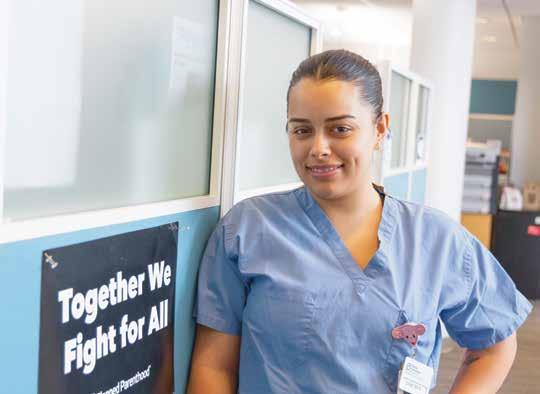
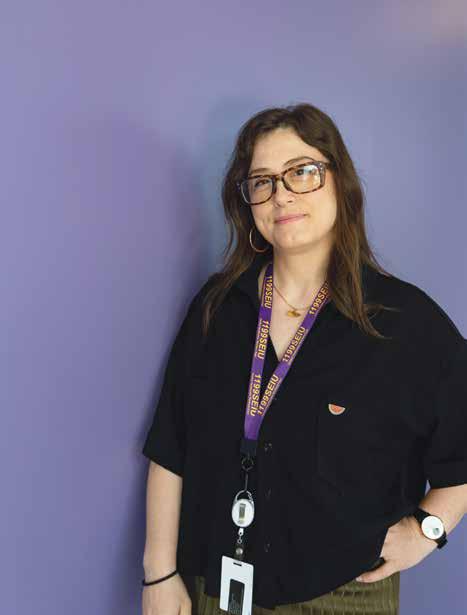
3. “This is my first job in the healthcare field, but it is something I have always wanted to do,” says Jocelyn, whose role as a Healthcare Assistant (HCA) often involves providing emotional support. “Having an abortion is a big decision that is hard and heavy for some people. I need to be good at regulating my own emotions, so that I can be there for people. You are interacting with people on what can be the worst day of their lives.”
As an active member of the bargaining unit, she has now joined the Labor Management Committee and is about to become a Delegate.
Jocelyn credits a no-holds-barred sex education program provided by her church with her positive attitude towards discussing intimate matters with patients.
Despite her early desire to work in healthcare, she started off in retail. But Joycelyn believes that she’s better equipped for her role in PPLM now that she is a bit older. “It is heavy work and I’m more emotionally equipped now than I used to be,” she says.
4. As a Registered Nurse at Planned Parenthood, Dari provides health care information in an effective, efficient and nonjudgemental manner.
5. “My job is to do all the things to make sure that nothing falls through the cracks,” says Beret, a Centralized Services Healthcare Assistant. “I do the follow up care after appointments. For instance, if someone has a medication abortion, I make sure that they know about coming in for an ultrasound and blood work. I also send reminders about routine checkups like PAP smears.”
Before starting her current role, Beret was an HCA. As a single parent of two young people, aged 12 and 15, pay was definitely an issue prompting her to become active in the Union drive. “I pay over 50 percent of my wages in rent, and being a parent is costly,” she says. “Things have improved since our first contract was ratified. But before that, there were no clear boundaries around workload. Often, we would not get out of the clinic until 9 p.m.”
The $2.40 per hour pay increase when the first contract was ratified last September was a big help, Beret adds. “We used to have merit increases and the occasional ‘market adjustment,’ the last one was just 60 cents!”
1199 Magazine 11 10 May-June 2024
2 4 5 3
Nurses of Distinction
The annual celebration during Nurses Week to honor the most committed to the profession.
It was a glamorous occasion when 1199 members and staff came together at the Marriott Marquis in Manhattan on May 10, to honor the nominees and winners of the annual Nurses of Distinction Awards.
Angela Sanchez, a politically active RN from One Brooklyn Health Brookdale Hospital, won the Hospital Setting prize along with First Runner-up Angelo Toro, from Montefiore Medical Center Wakefield, and Second Runner-
Lyubov Zajac, the first runner up in the Nursing Home Setting category (center) with fellow nurses from the Mary Manning Walsh Nursing Home and Rehabilitation Center in Manhattan.
up James Moriah, from St. John’s Episcopal Hospital.
As an 1199 Delegate, Sanchez was a vocal champion of the Medicaid equity campaign during the recent New York State budget negotiations. As a healthcare provider at a safety net hospital, she sees firsthand the need for equitable funding.
“I feel very attached to my community. I have been a Union member for almost 20 years, and I know that I am working where I’m most
needed and my service can make a real difference,” Sanchez said.
She is also active in her local community in Brooklyn, helping to distribute clothing and toiletries to recently-arrived immigrants on a monthly basis.
Betty Jeanty Bernard, from Schulman and Schachne Institute for Nursing and Rehabilitation— also part of Brookdale University Medical Center—won in the Nursing Home Setting category.

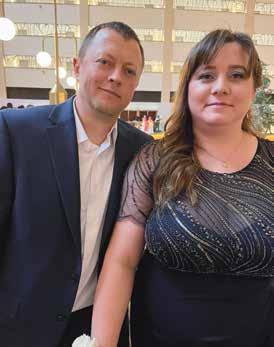
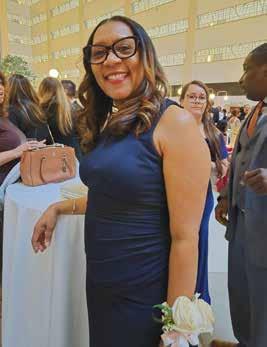
The First Runner-up in that category was Lyubov Zajac, from the Mary Manning Walsh Nursing Home and Rehabilitation Center.
Two of the newest members of the 1199 family—Caitlin Wing and Brandon Rosario—also attended the celebration. Both are recently graduated RNs from Clara Maass in New Jersey and have been active in the campaign to negotiate a first contract at their facility.
Sheraine Reid-Walters, from Montefiore Medical Center Wakefield, in the Bronx, won in the Novice Nurses category. Oksana Shchudlyak, one of the other nominees, is from Mount Sinai Brooklyn. She emigrated to the U.S. from the Ukraine in 2014, with her husband Amatoliv. Her father has since joined them, as well. Her husband still has family back in Ukraine.
Rachel Glennon, an 1199 RN from Mid Hudson Regional Hospital in Poughkeepsie, was also nominated in the Novice category.
“I have been here for 19 months, and I have never worked in such an amazing place,” she said. “The leadership here believes in me. In the last three months, I have moved into ICU, which was always my goal. I started in progressive care and I’m proud of my growth. I hope I can inspire my co-workers.”
The Nurse Leader category was won by Frantz Dorestant, Jr., from Long Island Jewish Forest Hills Hospital. Gloria Otoo, from St. John’s Episcopal Hospital, took the Advanced Practice RN prize, and Hoda Farghaly, of Mount Sinai Queens Hospital, was the Nurse Preceptor award winner.
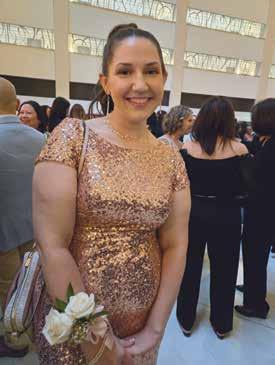
“I know that I am working where I’m most needed, and my service can make a real difference.”
– Angela Sanchez
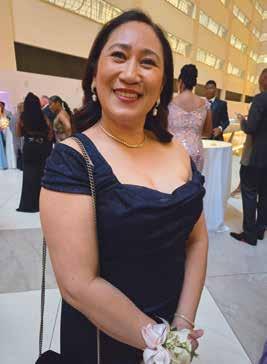
1199 Magazine 13 12 May-June 2024
OUR UNION
Clockwise from top left: RN nominees Oksana Shchudlyak, with her husband, Amatoliv; Lorna Rainford, Zenaida Dimaculangan and Rachel Glennon.

Power Building
Thousands of union members converge on Philadelphia for the quadrennial SEIU Convention.
“We cannot be a union if we’re divided. We have to stick together and protect one another. If any one of us is attacked, we are all attacked.”
– Isaias Ruiz, an 1199 PCA from Bellingham, Massachusetts
1199SEIU local has roughly 450,000 members in institutions stretching all the way from the northernmost parts of New York State—near the Canadian border— down to the south of Florida. But when it comes to flexing union muscle on the national stage, 1199 joins forces with another 1.5 million members across the entire U.S. and Canada who also belong to the Service Employees International Union (SEIU).
Every four years, a collection of roughly 1,500 delegates—elected to represent the views of the entire two-million-strong SEIU membership—come together at the SEIU Convention to agree the political direction and priorities of this massive labor collective, while the rest of the country gears up for the general election in November.
When convention delegates met in Philadelphia from May 19-22 this year, they elected April Verrett to be the new SEIU president, taking over for Mary Kay Henry, who is retiring. Verrett has pledged to dismantle structural racism and tackle the rise in corporate power head-on.
U.S. Vice President Kamala Harris also addressed the convention. “November is going to be about two choices, so let’s be clear about that,” she said. “Whereas, the last administration buried our country in debt to pay for tax cuts for billionaires, we are helping dig families out of debt by telling billionaires to pay their fair share.”
The administration of President Joe Biden and Vice President Kamala Harris may be one of the most pro-labor in history, but that has not yet translated into a clear lead in the
polls, as voters grapple with costof-living increases and widespread disinformation.
In order to help usher in another pro-worker administration in January 2025, SEIU members will target about six million people who are infrequent or reluctant voters in states like Arizona, Georgia, Michigan, Nevada, North Carolina, Pennsylvania and Wisconsin. In a razor-thin election, these voters are likely to be critical.
Sophia Colley, an 1199 CNA from Titusville Rehab and Nursing near Cape Canaveral, Florida, took to the convention stage to introduce one of the speakers. “To be on stage presenting for 1199 Florida, I was beyond excited,” she said. “To be backstage was just breathtaking. I am elated. It energized me even more to continue the work of our union.”
Opposite page: Massachusetts members Isaias Ruiz (center) and
(right) marching in union solidarity at the Philadelphia convention.
Members making their voices heard at the Healthcare Division Leadership Assembly

1199 Magazine 15 14 May-June 2024
OUR UNION
Noemi Guevera
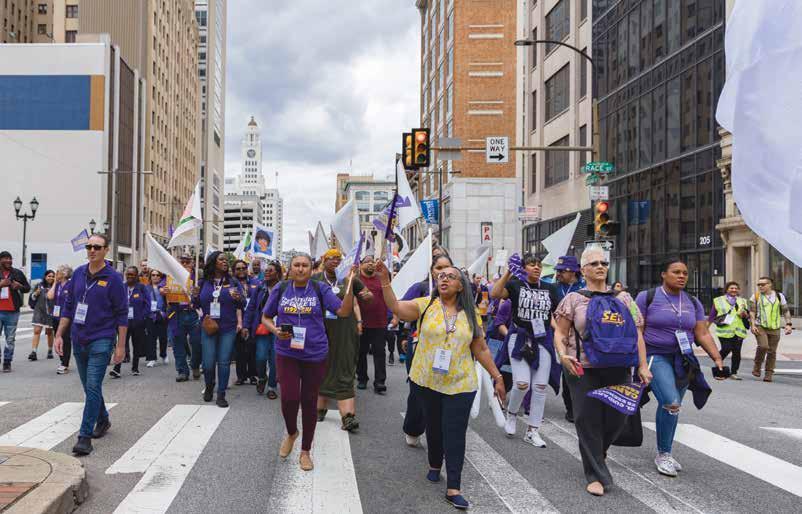
“As a union, we are not only fighting for ourselves. We are also fighting for vulnerable people like our seniors and our children. It was so exciting to be here and feel all the collective power in the room.”
– Ana Medina, 1199 Home Care Delegate from the Bronx, NY
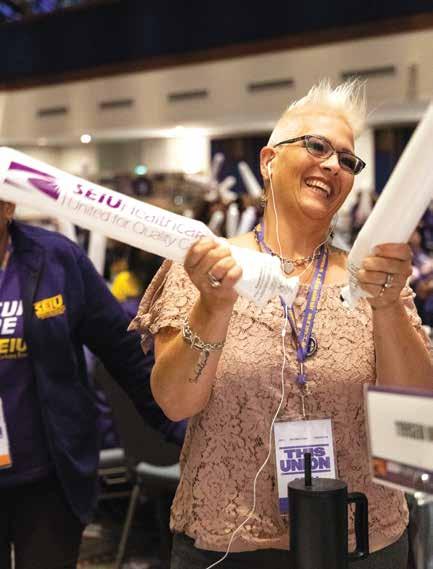
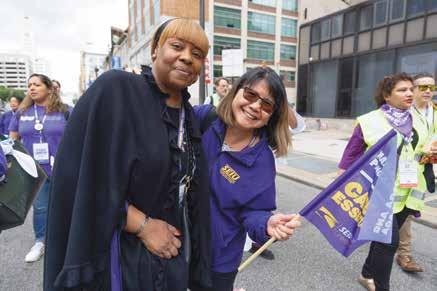
Isaias Ruiz, an 1199 PCA from Bellingham, Massachusetts, was attending the convention for the first time. He felt so strongly that one of the resolutions was not inclusive enough—that he stood up in front of thousands of people to add a friendly amendment.
“I felt like it was missing LGBTQ+ protections, multireligion protections, and disability protections for the work environment,” he said. “I felt compelled to represent those groups on the mic and to insure that as a union we’re working on everybody’s issues. We cannot be a union if we’re divided. We have to stick together and protect one another. If any one of us is attacked, we are all attacked.”
Maria “Ludi” Ramos, an 1199 RN at Mount Sinai Queens, took part in a panel at the healthcare delegation meeting, describing the union difference in New York during the height of the pandemic.
“I’m always proud and happy to be a union member, but during COVID that was one of the times that I was so happy to be because I know with 1199 we have a voice,” she said. “We have a partnership with management. That didn’t
happen by chance. We demand to be part of the decision-making process. At a time when the CDC guidelines were questionable [regarding PPE], we pushed back. If they said use regular masks, we said no—that is not enough.”
Ramos added that when “hospitals were running out of isolation rooms and putting people all over the hospital,” workers demanded “HEPA [high efficiency particulate air] filters in those rooms to keep members safe.”
Noemi Guevara, an HIV Prep Navigator at Boston Healthcare for the Homeless, voted to join 1199 earlier this year, along with 250 of her co-workers.
“It is really nice to be at this convention because we are heading into contract negotiations soon and I’m learning a lot from everybody. It is really helpful to bring all this info into the negotiations,” she said.
Ana Medina, an 1199 Home Care Delegate from the Bronx, NY, said union members are not just fighting for themselves. “We are also fighting for vulnerable people like our seniors and our children,” she said. “It was so exciting to be here and feel all the collective power in the room.”
Opposite page top: 1199ers showing their strength in Philadelphia.
Opposite page bottom: Jennifer Negron, a delegate at Coolie Dickson Hospital in Northampton, MA, inside the convention center.
New York RNs Barbara Moody (left) and Maria “Ludi” Ramos (right).
New York State budget
Members in New York worked hard throughout the winter and early spring to keep up a steady drumbeat of emails, calls, rallies and lobby visits in Albany to roll back major cuts to healthcare spending that were initially proposed by the New York State Governor, Kathy Hochul.
Leaders in the NYS Senate and Assembly responded to the 1199ers demands by creating their own budgets, which reversed cuts and proposed significant investments in care. This set the table for final negotiations, which ultimately resulted in a strong budget agreement that protects healthcare and puts us on a positive path forward.
Highlights of the NYS Budget include: A new tax on insurance companies that will receive matching funds from the federal government to support Medicaid-funded services; An additional $800 million for safety-net hospitals plus other state and federal funding sources for financially struggling hospitals; The creation of a single, statewide Fiscal Intermediary (FI) to handle financial transactions for consumer-directed home care which will also eliminate the anti-union FIs.
In the end, the budget still falls short of what is truly needed to fix the real crisis facing the healthcare workforce and safety net providers. But 1199SEIU members can feel tremendously proud of the work they did, knowing it meant reversing the Governor’s proposed cuts and advancing our goal of Medicaid equity.
16 May-June 2024 1199 Magazine 17 ALBANY ROUNDUP
Delegate Profile Mary Samaroo
An 1199er for three decades charts her path to discovering that the key to leading is being able to listen to others.
“I never liked politics, it was not what I wanted to be a part of in any form or fashion, but that changed with Obama,” says Mary Samaroo, LPN at Queens Nassau Nursing Home and 1199 Delegate for the past five years. “That year Obama was running, I don’t know what got into me, but I was working in OPWDD [Office for People With Developmental Disabilities] and knew I had to spread the word. I told them, ‘You have to vote.’ I got all my colleagues to vote and I gave [political] donations for the first time.”
Samaroo’s journey to become a Union Delegate had a similar trajectory. “I never thought I’d want to be a delegate or want to do it,” Samaroo says. “But my organizer saw something in me, and saw I was always helping in the background. She would say, ‘You would be a good delegate,’ but I would turn her down. It wasn’t until I came into work one day and heard that there was an election, and all the staff voted for me,” Samaroo laughs. “I guess that was that.”
Born and raised in Guyana as one of nine siblings, Samaroo quickly learned how to negotiate challenges and to care for others. “I have a family that beats me up because I’m one of the younger siblings,” Samaroo chuckles. “I
MARY
SAMAROO
1199 Delegate
had to learn how to choose my battles. With that many siblings, you’re gonna fight for or about something, but have to remember that when you wake up tomorrow, they’re still your family.” Samaroo knew at a young age she would be in healthcare. “My mom would say that I always wanted to be a nurse. Like, at five-years-old, I would tell her I would become a nurse.”
While at home, Samaroo also helped to take care of her younger brother, as well as a younger sister with special needs.
She moved to the United States when she was 26 years-old. Samaroo started working as an LPN, which she’s now been doing for more than 20 years. She’s been with 1199 for over 30 years. Through her work as a delegate and leader, Samaroo has had opportunities to advocate for others, including lobbying in Albany during New York State’s recent budget fight; going door-to-door canvassing in Pennsylvania for Senator John Fetterman; and even having the opportunity to meet and introduce President Joe Biden and Vice President Kamala Harris. “It was on my birthday. I spent the day in Philadelphia because Biden and Harris were opening their campaign [for re-election] that day, and I spoke about my experiences,
and the importance of investing in quality care,” she says. Her speech was recorded, and when she showed it to her mom, it was quite a shock. “My mom said, ‘You [say] you don’t want to be a politician— but you sound like one!”
Over the years, Samaroo has learned that the key to leading is being able to listen to others. “Since becoming a delegate, I have learned to deal with people of all walks of life; doesn’t matter who they are and if you like them or not; you deal with people how you’d want someone to deal with you,” she says. Being a leader is also an opportunity to teach, especially with an eye towards the future. “It’s one thing to give you a fish, but I’ve also got to teach you how to fish. I tell people I’m not going to be here forever; I try to teach or guide people so they can make the best choices for themselves. It’s about what we’re leaving for the younger generation. If we’re not leading by example, they are going to think we’re just talking—and not walking out what we say.”
Samaroo’s motivation to keep doing the work comes from both her passion about caregiving and her faith. “I have a passion about trying to help others not looking for anything in return,” she says. “It’s like that part in the Bible— that we are here to serve and not be
served, like Jesus, [having] the life of a servant. I’m here because of those who said a prayer before me, and now here I am working and moving it to the next generation.”
Samaroo has a lot of hope for future generations and wants to support them. “I try my best to help others get into politics—‘One soul at a time,’ is what we say in church,” she laughs. “I’ve learned that I won’t get everybody involved, but I aim for one person at a time, and I’m trying to work with the younger generation. I see a lot of potential in them; I see in them things they haven’t seen in themselves.
I always want to be an example that others can strive for, and know that you can do anything you set your mind to do. Look at me now! There is nobody in heaven that could have thought I would go on a campaign or help in politics—I hated my high school Political Science class—but now, here I am! Someone saw something in me that I didn’t see in myself, and now I just try to do the best I can for everybody.”
Correction: In the last edition of the 1199 Magazine, the name of the retired member profiled on p. 21 was incorrectly spelled. It should have read: Evette Weeks.

“It’s about what we’re leaving for the younger generation. If we’re not leading by example, they are going to think we’re just talking— and not walking out what we say.”
1199 Magazine 19 OUR UNION 18 May-June 2024
A Special Kind of Therapy
How members are taking their case to Albany to increase access to Creative Arts Therapies.
Some trauma is buried too deeply to be spoken about. If the emotional pain is too intense, the sufferer may not be able to bring it to the surface using talk therapy. Small children and those with cognitive disorders may not even have the language to describe their pain in words.
That is where 1199 licensed creative art therapists come in. These specially-trained professionals know how to use art, music, drama, dance and even poetry to draw people out and help them come to terms with emotional distress.
Creative arts therapies are especially effective for treating people who have lived through trauma and for people who struggle to benefit from talk therapy. This includes
Too often, therapy is written off as a luxury for the affluent. However, this misconception could not be further from reality.”
– Gabriela AschOrtiz, 1199SEIU Delegate and Licensed Creative Arts Therapist at NewYork Presbyterian
Gabriela Asch-Ortiz

children, teenagers, and those with severe psychiatric needs.
Gabriela Asch-Ortiz, an 1199SEIU Delegate and Licensed Creative Arts Therapist at NewYork Presbyterian hospital explains, “Not everyone is able or even wants to process their feelings verbally. Children in foster care, people with Alzheimer’s disease, and even newborn babies can benefit from creative arts therapies.”
Her therapeutic modality is music and she described a case where soothing music was able to calm a newborn baby with brittle bone disease, which in turn, allowed his mother to feel safe enough to hold him again.
But creative arts therapy is currently out of reach for many people who would greatly benefit from it because it is not covered by health insurance programs, including Medicaid.
That is why 1199SEIU is urging legislators to support a bill (S6362/ A6173) in the New York State legislature that would allow LCAT services to be covered by health insurance— so that New Yorkers can access healthcare that uniquely suits their needs. The bill mandates that health insurance policies must cover outpatient treatment by all mental health practitioners.
On April 17, members showed up in force in Albany to speak directly with their elected leaders about the issue. As this edition was going to press, 1199ers were still actively calling their elected representatives, urging them to support the legislation.
“I don’t think all members realize that if we have a problem that stems from decisions being made by elected officials, we can reach out to the Union’s political action team
for support,” said Asch-Ortiz. “When 1199 jumped on board, we were able to work collectively, and it moved everything for our coalition and helped us to navigate the complicated world of New York State government in Albany. By working together with our Union, we have so much more power at the table. As a proud 1199 Delegate, I am acutely aware of the necessity for collective organization and power.”
The lack of insurance coverage is both detrimental to the profession and those needing care, Asch-Ortiz pointed out.
“Too often, therapy is written off as a luxury for the affluent. However, this misconception could not be further from reality,” she said. “At NewYork-Presbyterian, we not only advocate for ourselves, but also for our communities and the individuals under our care, recognizing that our collective strength surpasses the sum of our individual efforts.”
Melissa Ulloa, is an 1199 LCAT at the Family PEACE Trauma Treatment Center, also in the NewYork Presbyterian network. She works with children from birth to 5 years-old, some of whom are in foster care or living in the shelter system. “Some of the trauma these children experienced may have happened before they could talk,” she said. “Using art therapy, we can help them come to terms with it on a sensory level.”
Said Ulloa, “It is so important to make sure that your voice is heard in your community so that you can be a part of positive change.”
There is a mental health crisis in New York City—with not nearly enough providers to cope with the need. There are 2,000 LCATs across the state, which are a vital resource that must be fully utilized.

S olidarity LGBTQ+
The mission statement of 1199’s constitution reads as follows: “We are determined to protect and advance the lives of our members—not only on the job, but also in our communities and in our society.”
OUR UNION
OUR HISTORY 1199 Magazine 21
20 May-June 2024


Previous page:
Agatha Ferdinand, an 1199 Nurses Aide at Cabrini Hospice comforts a man with AIDS in 1990.
Members at Callen-Lorde Community Health Center in 2015 after voting overwhelmingly to join 1199.
Donna Payne, the Associate Director of Diversity at the HRC pictured in 2008.
That guiding principle, together with organization, unity and vision, helped to make the Union a labor and civil rights powerhouse.
Unfortunately, during 1199’s early years, the rights of some workers were not adequately addressed in society at large. Discrimination based on sexual orientation and gender identity continues to this day, but at that time it was commonplace.
The 1969 Stonewall Uprising is widely regarded as a turning point that challenged outdated attitudes. The Greenwich Village protest helped progressives to see multiple interlocking systems of oppression more clearly. During the 1970s, LGBTQ+ (lesbian, gay bisexual, trans, queer, plus other sexual identities) workers and their allies began to organize more openly throughout society. In the workplace, the fight centered on contract protections against discrimination based on sexual orientation.
The HIV/AIDS crisis of the 1980s and 1990s brought into even sharper relief the discrimination, marginalization and silencing of the queer population. The group ACT UP (AIDS Coalition to Unleash Power) dramatized the need for a healthcare system that would meet the needs of the most vulnerable.
A Feb. 23, 1988 New York Times article quoted Kathy Abelson, the then 1199 Executive Vice President of the RN division, on the need for adequate compensation to address the shortage of hospital nurses and technicians during the crisis. Just days before, hundreds of nurses at Lincoln Medical and Mental Health Center in the Bronx struck to protest poor working conditions which adversely affected the care of AIDS patients.
The journey of 1199er Val S. Dickerson
is indicative of the work and commitment of members. Beginning in 1990, Dickerson was a volunteer at the Gay Men’s Health Crisis (GMHC), providing support and handling errands for AIDS patients. In 1991, he worked with AIDS patients at Manhattan’s Columbia Presbyterian Hospital. Many of the patients were estranged from family and friends. “The staff in the hospital was their family and support system,” Dickerson said. He continued his AIDS work in 1995 at Rivington House.
Throughout the crisis, many of the more than 2,000 social workers in the Union played a central role in helping patients and community residents access an array of health and wellness services.
1199 also sought to amplify the voices of activists by bringing them into the 1199 family. In 1994, lawyers and dietitians at the GMHC beat back a vicious anti-union campaign to vote in 1199. They were unable to secure a first contract, but they worked to amend 1199’s constitution to include sexual orientation as a protected category.
Similar to 1199SEIU’s 1969 hospital campaign in Charleston, South Carolina, GMHC workers were unable to secure a first contract, but their struggle jumpstarted other organizing victories. Workers at HIV/AIDS clinics in Los Angeles, San Francisco, and Seattle won SEIU organizing campaigns.
In 1997, 1199SEIU members at Whitman Walker Health in Washington DC, were among the first in the nation to win contracts affirming the rights of trans workers. They have also since won full domestic partner benefits, and protection for gender expression and transition-related healthcare coverage.
1199SEIU represents other major civil rights organizations. Two of the oldest are the National LGBTQ Task Force founded in 1973, and the Human Rights Campaign (HRC) founded in 1980.
The December 2002 the 1199SEIU magazine announced the formation of the Union’s Lavender Caucus. The subhead of the article read, “We are coming out, so we
won’t be left out.”
Dollie Green, then a CNA at New York’s Campbell Hall Rehabilitation Center, was one of two members interviewed. “I’ve never been an activist,” she said, “but I feel strongly about domestic partner benefits and ensuring that all members receive the same benefits regardless of their sexual orientation.”
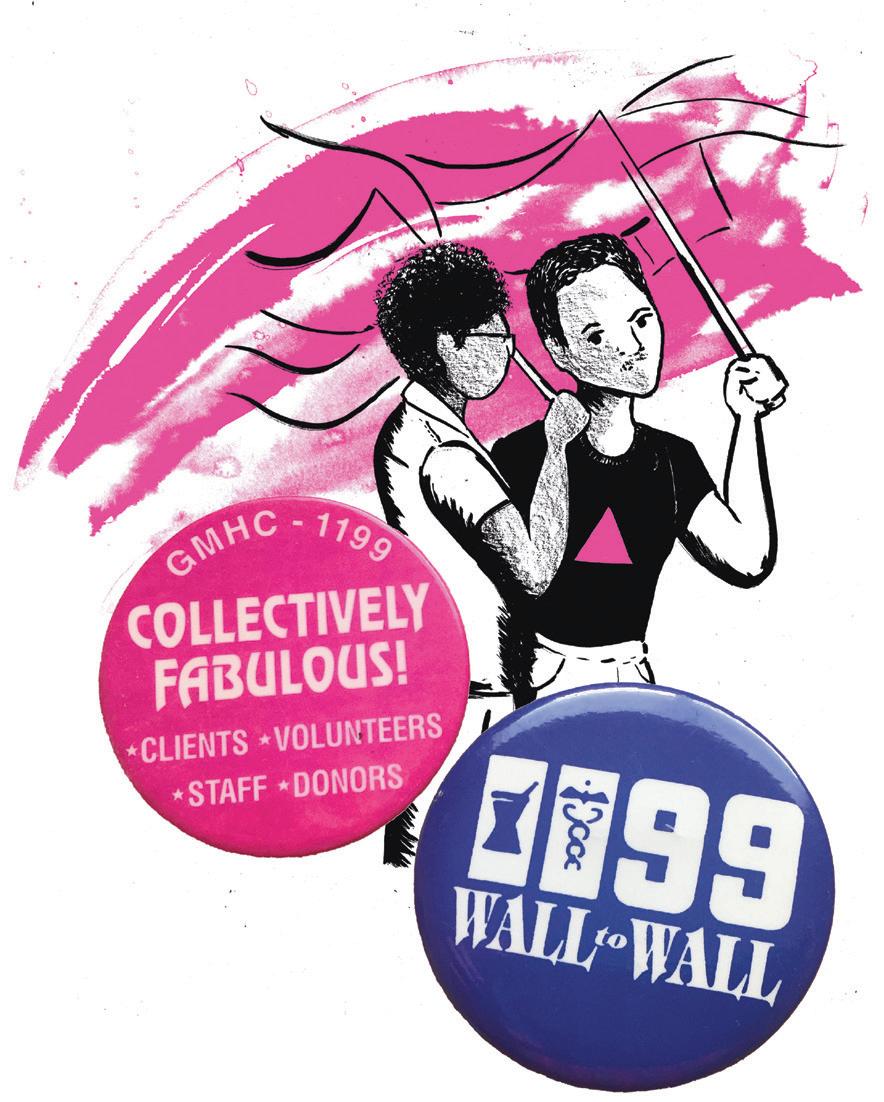
The Caucus worked closely with the SEIU Lavender Caucus, co-founded by Mary Kay Henry, outgoing president of SEIU, and the first women and openly gay person to hold that position.
In August 2008, the 1199 Magazine featured Donna Payne, HRCs associated director of diversity. Among her coalition partners were members of the faith community. At the time of the interview, Payne was about to host the very first Democratic Party convention for LGBTQ+ people of color.
The year 2011 was a productive year for 1199’s caucus. On June 24, it hosted a gathering to hail the passage of New York State’s marriage equality bill. On Dec. 10 of the same year, the caucus hosted a wellattended Communities of Faith Against Hate breakfast.
That level of high visibility has inspired many LGBTQ+ workers to join the Union. In 2015, workers at Callen-Lorde Community Health Center voted 1199. They were followed by workers at APICHA, and Hetrick Martin Institute in New York City. Baltimore’s Chase Brexton Health Care workers joined in 2016. Queer and trans members were key organizers when 1199 began organizing Planned Parenthood clinics in 2019.
Another high point for the caucus was the international World Pride celebration, which also marked the 50th anniversary of the Stonewall uprising. Last year, workers at Fenway Health in Boston also voted 1199.
On June 30th, 1199ers of all gender identities and sexual orientations will take part in Pride events throughout the Union’s regions to help hasten the day when no one will be left out.
“We are coming out, so we won’t be left out.”
1199 Magazine 23
OUR HISTORY
Annabelle Heckler
22 May-June 2024
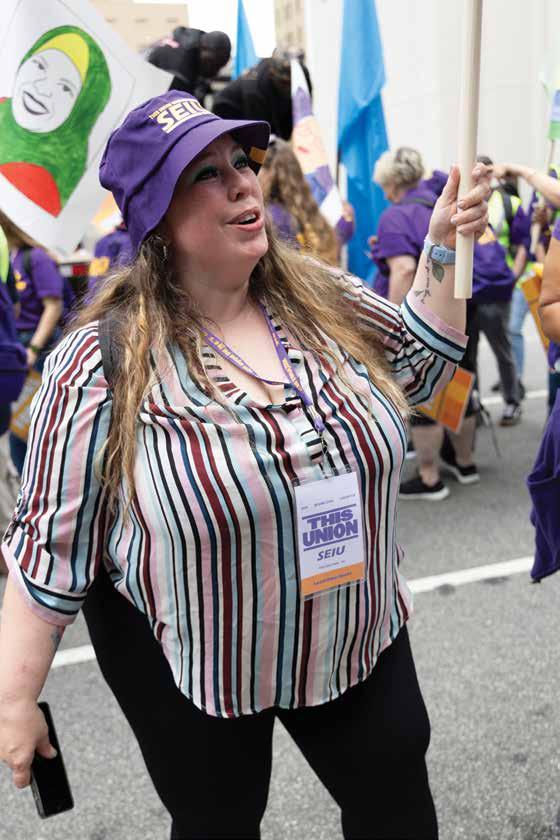
Jennifer Parker, a Unit Secretary at HCA’s Osceola Hospital, at the SEIU Convention march in Philadelphia. See page 14.
1199 Magazine 24




















































